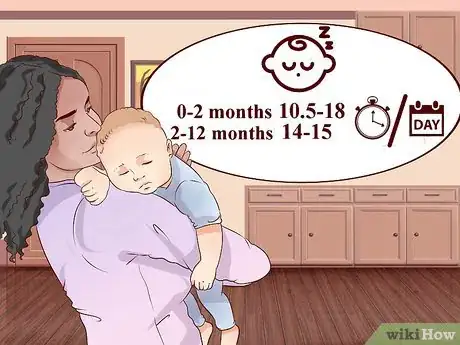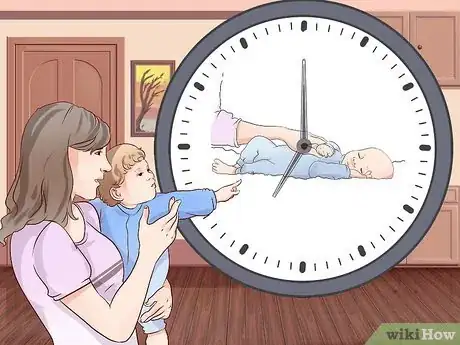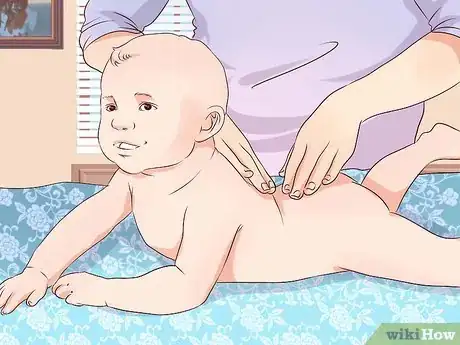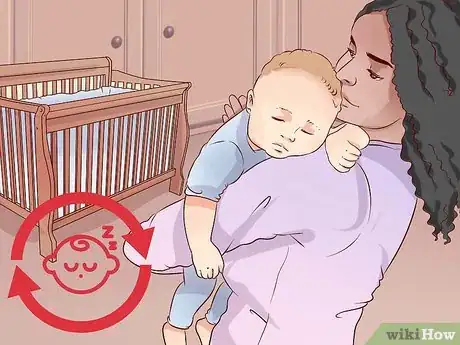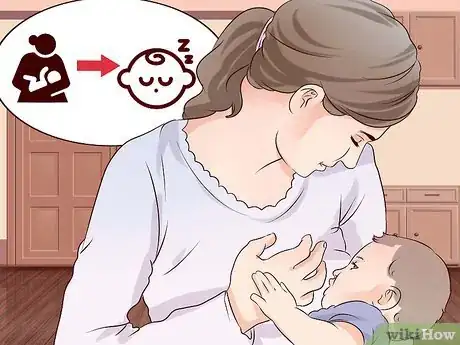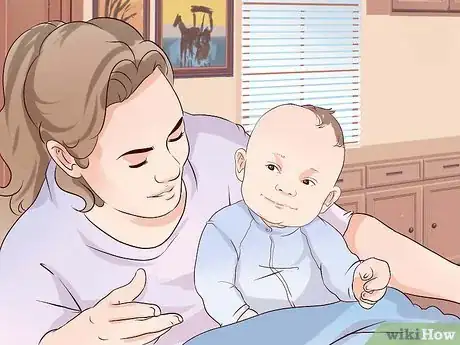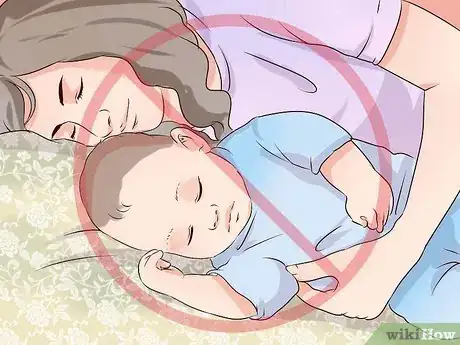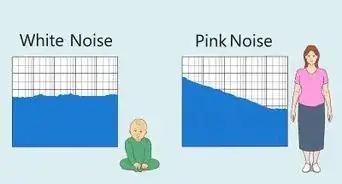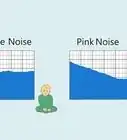This article was co-authored by Corey Fish, MD. Dr. Corey Fish is a practicing Pediatrician and the Chief Medical Officer at Brave Care, a pediatric healthcare company based in Portland, Oregon. Dr. Fish has over 10 years of experience in pediatric care and is a member of the American Academy of Pediatrics. Dr. Fish received a BS in Biology from Pacific Lutheran University in 2005, an MD from the University of Washington School of Medicine in 2009, and completed his Pediatric Residency at the University of Texas Southwestern Medical School in 2012.
There are 9 references cited in this article, which can be found at the bottom of the page.
This article has been viewed 54,039 times.
Many mothers who have sleepless babies nurse them either to or back to sleep. If your baby is old enough, however, she/he likely doesn’t need to be nursed in order to go to sleep.[1] By stretching out your baby’s feedings throughout the day and into the night and establishing a sleep routine, you can successfully get your baby to sleep without nursing.
Steps
Establishing a Sleep Routine
-
1
-
2Fix a consistent bedtime. Set a consistent bedtime that incorporates a routine. This can help her fall asleep without nursing in addition to relaxing her and regulate her sleep cycle.[4] [5]
- Consider naps, feedings, and your baby’s age when fixing her bedtime.[6] Don't worry about setting bedtimes during the first two months.
- Set a reasonable bedtime for you and your baby. You may want some “me time” after putting your baby down for the night.[7]
- You may need to tweak the schedule occasionally to accommodate activities or other factors like illness.[8]
Advertisement -
3Promote relaxation before bed. Most babies require some time to shift into bedtime mode. Promoting relaxation through rituals and environment can help your baby relax and get to sleep, especially without nursing or feeding.[9]
-
4
-
5Optimize the sleeping environment. Create a room for your baby that promotes relaxation and sleep. Setting an optimal temperature, dampening noise, and shutting out light can help fall and stay asleep.[17]
- Set the room temperature between 65 and 75°F (18.3 to 23.8°C).[18]
- Remove anything from your baby’s room that may stimulate her, such as electronics.[19]
- Control light with soft bulbs and curtains or blinds. Using a night light in a non-stimulating color like red can help you find her or even reassure her.[20]
- Use a white noise machine to dampen noises that may otherwise wake your baby.[21] [22]
- Remove blankets and soft items from the crib or bassinet to prevent suffocation.[23] [24]
-
6Put him down while he's still awake. Place your baby in his crib or bassinet when he is drowsy but awake. This can help him associate the bed with sleep and reduce his need to nurse in order to sleep.[25] This can also reduce the amount of nighttime care you provide.[26]
- Place your baby on his back to sleep.[27]
- If he stirs when you put him in the crib, allow him to adjust and then see if he falls back asleep. If not, pick him up again until he is drowsy.
-
7See your pediatrician. If your baby isn’t sleeping or requires nighttime feedings after six months, schedule an appointment with your pediatrician. She may be able to assess why your baby is still hungry at night or if your baby is just wanting feeds for the attention and affection.[28]
- Prepare notes on your baby’s sleep and feeding patterns to take to the appointment with you. This can help your doctor more effectively diagnose what may be going on with your baby’s sleep cycle and give you tips to improve it.
Stretching Out Feedings
-
1Understand babies’ sleep cycles. Babies have different requirements for sleeping and eating depending on how old they are. Learning about the sleep cycles of babies can help you more effectively get your baby to sleep without nursing.[29]
- Babies generally do not require nighttime feedings once they weigh 11 pounds.[30]
- Newborns need to eat more often and generally sleep for up to three hours in between feedings.[31] This means you may need to wake your baby to feed him until he is old or weighs enough to sleep without eating.
- Between two to three months and depending on weight, your baby may need an additional feeding at night. Most two to three months old babies need one to two feedings at night. They usually need to feed by five to six hours. [32]
- After four months, most healthy babies do not metabolically require feedings during the night and can usually sleep for seven to eight hours without a feeding.[33]
- Talk to your doctor if you have any questions about what is feasible.[34]
-
2Cut down nighttime feedings. At around three months, reduce the number of nighttime feedings you give your baby. This can ultimately help reinforce the baby falling asleep without nursing.[35]
- If your baby cries, either allow her to stir to see if she goes back to sleep or give her a pacifier, which may soothe her right back to sleep without feeding.[36]
-
3Fill up the baby before you sleep. Giving your baby a few sips of milk before you go to sleep may keep him from waking during the night. Wake him up and let him take a few sips, even if he is too tired to drink.[37]
-
4Extend time between feedings. Once your baby no longer needs to be fed every two to three hours (usually around three to four months old), stretch out the time in between her feedings. This can help her realize that she doesn’t need to nurse to sleep.[40]
- Add ½ hour between feedings at night every other night. After a few weeks, your baby may no longer need to nurse to fall or stay asleep.[41]
-
5Decrease nighttime feedings. Spend a little less time nursing during your baby’s nighttime feeding(s). By gradually decreasing the amount of time you nurse, you can signal your baby that he can sleep without nursing.[42]
-
6
-
7Give your baby a pacifier. The sucking action of nursing may soothe him to sleep. By giving him a pacifier, he may be able to fall asleep without nursing. Research has also shown that pacifier use while sleeping can reduce the risk of sudden infant death syndrome (SIDS).[49]
-
8Provide nighttime care only as necessary. Most babies fuss and move around during the night. Only attend to her if she is unable to soothe herself back to sleep or seems sick.[50]
- Dim lights, speak in a soft voice, move minimally, and don’t put your baby directly at your breast. This helps your baby understand it’s time to sleep and disassociate nursing and sleeping.[51]
-
9Avoid co-sleeping. Although you may be tempted to have your baby close to you at night, avoid bed-sharing or co-sleeping. Not only can this tempt him to nurse himself to sleep, but it can also make it harder for him to fall and stay asleep.[52]
- Studies have shown that co-sleeping increases the risk for SIDS, suffocation, or strangulation.[53]
References
- ↑ http://www.whattoexpect.com/first-year/sleeping-through-the-night.aspx
- ↑ Corey Fish, MD. Pediatrician & Chief Medical Officer, BraveCare. Expert Interview. 17 March 2020.
- ↑ http://www.sleepforkids.org/html/sheet.html
- ↑ Corey Fish, MD. Pediatrician & Chief Medical Officer, BraveCare. Expert Interview. 17 March 2020.
- ↑ http://www.mayoclinic.org/healthy-lifestyle/infant-and-toddler-health/in-depth/baby-sleep/art-20045014?pg=2
- ↑ http://healthysleep.med.harvard.edu/healthy/getting/overcoming/tips
- ↑ http://www.sleepforkids.org/html/sheet.html
- ↑ http://www.sleepforkids.org/html/sheet.html
- ↑ http://www.mayoclinic.org/healthy-lifestyle/infant-and-toddler-health/in-depth/baby-sleep/art-20045014?pg=2
- ↑ http://www.sleepforkids.org/html/sheet.html
- ↑ http://www.sleepforkids.org/html/sheet.html
- ↑ http://www.mayoclinic.org/healthy-lifestyle/infant-and-toddler-health/in-depth/baby-sleep/art-20045014?pg=2
- ↑ http://www.mayoclinic.org/healthy-lifestyle/infant-and-toddler-health/in-depth/baby-sleep/art-20045014?pg=2
- ↑ http://www.mayoclinic.org/healthy-lifestyle/infant-and-toddler-health/in-depth/baby-sleep/art-20045014?pg=2
- ↑ http://www.mayoclinic.org/healthy-lifestyle/infant-and-toddler-health/in-depth/baby-sleep/art-20045014?pg=2
- ↑ http://healthysleep.med.harvard.edu/healthy/getting/overcoming/tips
- ↑ http://www.mayoclinic.org/healthy-lifestyle/infant-and-toddler-health/in-depth/baby-sleep/art-20045014?pg=2
- ↑ http://healthysleep.med.harvard.edu/healthy/getting/overcoming/tips
- ↑ http://www.sleepforkids.org/html/sheet.html
- ↑ http://www.sleepforkids.org/html/sheet.html
- ↑ http://www.sleepforkids.org/html/sheet.html
- ↑ Corey Fish, MD. Pediatrician & Chief Medical Officer, BraveCare. Expert Interview. 17 March 2020.
- ↑ Corey Fish, MD. Pediatrician & Chief Medical Officer, BraveCare. Expert Interview. 17 March 2020.
- ↑ http://www.mayoclinic.org/healthy-lifestyle/infant-and-toddler-health/in-depth/baby-sleep/art-20045014?pg=2
- ↑ http://www.mayoclinic.org/healthy-lifestyle/infant-and-toddler-health/in-depth/baby-sleep/art-20045014?pg=2
- ↑ http://www.mayoclinic.org/healthy-lifestyle/infant-and-toddler-health/in-depth/baby-sleep/art-20045014?pg=2
- ↑ http://www.mayoclinic.org/healthy-lifestyle/infant-and-toddler-health/in-depth/baby-sleep/art-20045014?pg=2
- ↑ http://www.mayoclinic.org/healthy-lifestyle/infant-and-toddler-health/in-depth/baby-sleep/art-20045014?pg=2
- ↑ http://www.whattoexpect.com/first-year/sleeping-through-the-night.aspx
- ↑ http://www.whattoexpect.com/first-year/sleeping-through-the-night.aspx
- ↑ http://www.whattoexpect.com/first-year/sleeping-through-the-night.aspx
- ↑ http://www.whattoexpect.com/first-year/sleeping-through-the-night.aspx
- ↑ http://www.whattoexpect.com/first-year/sleeping-through-the-night.aspx
- ↑ http://www.whattoexpect.com/first-year/sleeping-through-the-night.aspx
- ↑ http://www.whattoexpect.com/first-year/sleeping-through-the-night.aspx
- ↑ http://www.whattoexpect.com/first-year/sleeping-through-the-night.aspx
- ↑ http://www.whattoexpect.com/first-year/sleeping-through-the-night.aspx
- ↑ http://www.whattoexpect.com/first-year/sleeping-through-the-night.aspx
- ↑ http://www.whattoexpect.com/first-year/sleeping-through-the-night.aspx
- ↑ http://www.whattoexpect.com/first-year/sleeping-through-the-night.aspx
- ↑ http://www.whattoexpect.com/first-year/sleeping-through-the-night.aspx
- ↑ http://www.whattoexpect.com/first-year/sleeping-through-the-night.aspx
- ↑ http://www.whattoexpect.com/first-year/sleeping-through-the-night.aspx
- ↑ http://www.whattoexpect.com/first-year/sleeping-through-the-night.aspx
- ↑ http://www.whattoexpect.com/first-year/sleeping-through-the-night.aspx
- ↑ http://www.whattoexpect.com/first-year/sleeping-through-the-night.aspx
- ↑ http://www.whattoexpect.com/first-year/sleeping-through-the-night.aspx
- ↑ http://www.whattoexpect.com/first-year/sleeping-through-the-night.aspx
- ↑ http://www.mayoclinic.org/healthy-lifestyle/infant-and-toddler-health/in-depth/baby-sleep/art-20045014?pg=2
- ↑ http://www.mayoclinic.org/healthy-lifestyle/infant-and-toddler-health/in-depth/baby-sleep/art-20045014?pg=2
- ↑ http://www.whattoexpect.com/first-year/sleeping-through-the-night.aspx
- ↑ http://www.whattoexpect.com/first-year/sleeping-through-the-night.aspx
- ↑ http://www.sleepforkids.org/html/sheet.html
